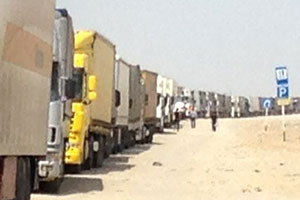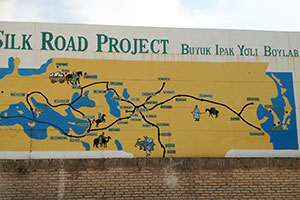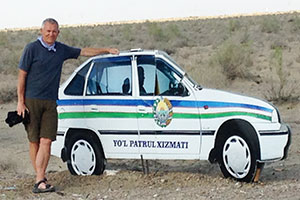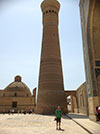|
Pharmacists Kirit Patel, Peter Cattee, Manvir Patel and Hiten Patel are heading overland from the UK to India by car and have reached Kazakhstan:
Day 18: Kazakhstan
Crossing into Kazakhstan was interesting. We had to cross over a pontoon bridge and it was an experience driving over waves. The border crossing took two-and-a-half hours as, due to a queue of lorries, the process was slow.
We had to buy car insurance again to travel through. We are glad we did because we were stopped that evening before reaching the next town.
The roads were the most atrocious I have ever driven on. They were narrow and full of potholes big enough to damage the car suspension.
We could only average 20 miles per hour and reached the town of Atyrau at 11pm. The clocks had moved forward so we now were four hours ahead of England.
|
|
|

|

I nearly ran over Peter's foot and Hiten almost flew off the top of the car!
|
The Kazakhs are extremely friendly and were willing to go the extra mile for us. Every night we stay in this country, we need to have a registration document showing where we slept.
Day 19
As we were crossing a large section of uninhabitable area, we decided to fill up our jerry cans with diesel.
For me, this day didn't begin well. While Peter was cleaning the car and Hiten was loading the bags at the top, I thought, as it was my turn to drive, I would start the engine to warm the car up. However, the car was in gear and it jerked forward as I started the engine – I nearly ran over Peter's foot and Hiten almost flew off the top of the car! I couldn't apologise enough. That's penalty number five.
Manvir has a nickname for me, KK, Kamikaze Kirit.
The whole country is below sea level, so the soil is very infertile. There are no bushes and I didn't see a single tree during our 600-mile trek. The Kazakhs are Muslim and we came across some beautiful cemeteries, where all of the tombs seem to be above ground.
Kazakhstan is an oil country; we saw numerous oil drilling wells and what I call 'oil donkeys' at work. Apart from wild horses, we came across hundreds of two-humped (bactrian) camels. I don't think the countryside has advanced much since the days of Genghis Khan.
That night someone tried to steal our jerry cans. Fortunately, we reversed the car against the wall to stop it from happening.
Kazakh markets were buzzing with life and the elderly ladies selling fruits and vegetables were keen for us to photograph them.
 Day 20
Day 20
The drive across Kazakhstan is not pretty and when we arrived at the Uzbekistan border we were shocked to see hundreds of lorries waiting to cross (pictured right).
The crossing was a nightmare in 30oC, plus we had to wait for 10 hours, with no toilets or any other services. The gates opened every hour to let a few vehicles in and, eventually, we were one of the fortunate ones.
After numerous checks of documents and our vehicle, we were just about to go when one of guards saw Hiten taking a photo of the border area. This led to all the phones and iPads, being confiscated except mine.
After an hour, they brought these back, after deleting all photos. We finally managed to cross at 8.30pm. It was too dark for us to go to Nukus, the next big town.
At the nearest village we decided to knock on a door at 10.30pm to ask about accommodation and were fortunate enough to be taken in by a family who charged us $120 to sleep on four mattresses laid out for us.
No country in the Central Asia seems to have it so good and yet as bad as Uzbekistan. The population is 30 million, the temperature is scorching hot and it has had its fair share of tyrants. However, if there was a hall of fame for cities in Central Asia, then Samarkand, Bukhara and Khiva would be the top three entries.
Day 21
We had heard about difficulties in finding diesel in Uzbekistan – I couldn't believe that garages didn't sell it.
The ones that did seem to have it were closed. Finally, after having used up most of our reserve tank, we began to worry. We were constantly driving on empty roads with few lorries going by.
At the last petrol station, a motorist overhead us asking about diesel. He took us to a house where Uzbek women, with their faces covered, were selling diesel. We were reluctant to fill our car with suspect diesel but ultimately had no choice. We bought 80 litres and managed finally to arrive in Nubus.
 We decided to follow the Silk Route (pictured left) due to its phenomenal history. The route connected the great civilisation of the East and West; the balance of trade was heavily stacked up in favour of China as it is today. China received gold, silver, rhino horns, horses etc, while the West needed silk, spices etc.
We decided to follow the Silk Route (pictured left) due to its phenomenal history. The route connected the great civilisation of the East and West; the balance of trade was heavily stacked up in favour of China as it is today. China received gold, silver, rhino horns, horses etc, while the West needed silk, spices etc.
Bukhara was situated at the crossroads. Kazakhstan is the ninth largest country in the world with a population of only 16 million.
Kazakhstan is rediscovering itself after the Soviet collapse. The old Silk Route goes through the bottom half of the country.
We stayed in Beyneu. There was an 'eastern' toilet, no shower, no choice, and no camping because there was no grass. The only hotel in town was the filthiest place I have ever stayed in; we didn't wish to use their bedding and so slept in our sleeping bags. The next day, we went over to cross the border into Uzbekistan.
Day 22
We visited the art museum in Nukus and then departed for Khiva. Legend has it that Khiva was founded when Noah's son Shem discovered a well here. Later, it was a major slave trading city where all the slave caravans came. The old city fort was built just over 500 years ago.
Babur, the first Mughal, was exiled from Samarkand to Kabul and later led an army to conquer northern India in 1500. He started the Mughal Empire in India and part of the Taj Mahal was subsequently built by one of his descendants in Agra. The Taj Mahal bears a strong resemblance to the Madrasah in the fort in Khiva.
Day 23
We set off for Bukhara but first stopped at Urgench to visit an ancient ruin of a fort built 2,500 years ago. It could accommodate 12 football pitches and was surprisingly neglected.
 In the last couple of days, we had come across four lifesize cardboard cut outs of police cars (pictured right) with a mounted speed camera. I decided to ignore the next one only for it to be a real one.
In the last couple of days, we had come across four lifesize cardboard cut outs of police cars (pictured right) with a mounted speed camera. I decided to ignore the next one only for it to be a real one.
The policemen flagged me down and once again the tourist card helped us as he let me off. We've already been through five police checks today.
Bukhara is Central Asia's holiest city. It has buildings spanning a 1,000 years of history situated at the crossroads of the Silk Route. It has a unique Jewish Quarter and the Jewish people have been here since the 12th century. I find it amazing that I am actually visiting places with great ancient history that I could only dream about seeing as a child.
Day 25
We visited the old city square where two British officers at the time of Queen Victoria were beheaded in public, and there is a fort that is more than a 1,000 years old.
 Inside the fort is the Kalyan minaret (pictured left), built nearly 900 years ago, also known as the Tower of Death. It is so majestic that, even when everything was being destroyed, Genghis Khan ordered it to be spared.
Inside the fort is the Kalyan minaret (pictured left), built nearly 900 years ago, also known as the Tower of Death. It is so majestic that, even when everything was being destroyed, Genghis Khan ordered it to be spared.
Inside the city is a city within the city known as the Ark citadel. Much of it was destroyed when the Russian Red Army attacked Bukhara. The Mir-i-Arab Madrasah is a splendid structure standing beside the Minaret.
The Uzbeks are very friendly. In the evening, we befriended some of them who kept buying us vodkas.
Tomorrow we set off for Samarkand.
Pharmacists on tour: part one
Pharmacists on tour: part two
Pharmacists on tour: part three
Pharmacists on tour: part four
Pharmacists on tour: part five
Pharmacists on tour: part seven
Pharmacists on tour: part eight
Pharmacists on tour: part nine
Pharmacists on tour: part 10
Pharmacists on tour: part 11
Pharmacists on tour: part 12
Pharmacists on tour: part 13
Pharmacists on tour: part 14
Pharmacists on tour: part 15
Kirit Patel is chief executive of Day Lewis. Kirit; Peter Cattee, CEO at PCT Healthcare; Manvir Patel, managing director of Manichem; and Hiten Patel, managing director of PharmaPlus, will be raising money for charity Pharmacist Support. To make donations and for more information, please click here. Follow them on Facebook and Twitter to hear more about their journey




 Day 20
Day 20 We decided to follow the Silk Route (pictured left) due to its phenomenal history. The route connected the great civilisation of the East and West; the balance of trade was heavily stacked up in favour of China as it is today. China received gold, silver, rhino horns, horses etc, while the West needed silk, spices etc.
We decided to follow the Silk Route (pictured left) due to its phenomenal history. The route connected the great civilisation of the East and West; the balance of trade was heavily stacked up in favour of China as it is today. China received gold, silver, rhino horns, horses etc, while the West needed silk, spices etc. In the last couple of days, we had come across four lifesize cardboard cut outs of police cars (pictured right) with a mounted speed camera. I decided to ignore the next one only for it to be a real one.
In the last couple of days, we had come across four lifesize cardboard cut outs of police cars (pictured right) with a mounted speed camera. I decided to ignore the next one only for it to be a real one. Inside the fort is the Kalyan minaret (pictured left), built nearly 900 years ago, also known as the Tower of Death. It is so majestic that, even when everything was being destroyed, Genghis Khan ordered it to be spared.
Inside the fort is the Kalyan minaret (pictured left), built nearly 900 years ago, also known as the Tower of Death. It is so majestic that, even when everything was being destroyed, Genghis Khan ordered it to be spared.
